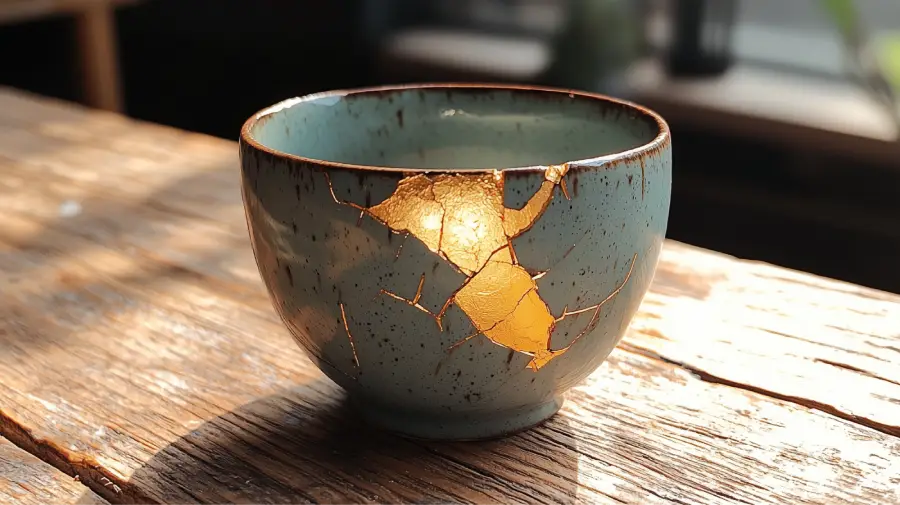Do you ever feel like something inside you is shattered—like you’re carrying invisible cracks that no one else can see? You’re not alone.
Many people experience moments of deep emotional pain, questioning their worth and wondering, “Am I broken?” It’s a heavy, isolating feeling, but here’s the truth: feeling broken isn’t a life sentence.
In reality, it’s your psyche’s way of sounding the alarm—a signal that old survival strategies, like perfectionism or emotional numbing, are no longer serving you.
Instead of resisting this feeling, try listening to it as you would a close friend. What is it trying to tell you?
Pain and fear aren’t proof that you’re broken; they’re invitations to healing.
They reveal the places where light can enter, guiding you toward wholeness.
What Does It Mean to Feel Broken?
Feeling broken isn’t a medical diagnosis or a mental health condition—it’s a deeply personal experience of emotional pain and disconnection. It’s that haunting sense of incompleteness, like something inside you has fractured, leaving you uncertain of how to put the pieces back together.
You might find yourself thinking, “I feel broken inside” especially after a traumatic or challenging event.
This feeling can bring waves of shame, self-doubt and hopelessness, almost as if a part of you has been lost.
It may feel like your emotions are out of control, your thoughts are spiraling and self-criticism has become your inner voice.
Research on emotional pain, describes this state as the Broken Self—a painful condition marked by emotional wounds, disconnection and a loss of identity.
Healing, according to this research, isn’t about erasing the pain but about transformation. It involves moving beyond a Covered Self—where parts of you remain hidden for protection—toward a Transformed Self, where new strengths and insights emerge from your struggles.
Feeling broken, while painful, is often a sign that something in your life needs healing—and that healing is usually closer than it seems.
Why Do I Feel Broken?
Feeling broken often stems from deep-seated thought patterns, past experiences or emotional exhaustion. It’s not a reflection of your worth, but rather a sign that something within you is seeking attention and healing.
One major factor is negative thought patterns.
All-or-nothing thinking can make you believe you’re either perfect or a failure, causing minor setbacks to feel catastrophic.
Similarly, catastrophizing—imagining the worst possible outcome—can make life’s difficulties seem insurmountable, reinforcing the sense that you’re beyond repair.
Childhood experiences and past relationships also play a powerful role. If you were frequently criticized or made to feel inadequate growing up, you may have internalized core beliefs like “I am unworthy” or “I am fundamentally flawed.”
These beliefs often operate in the background, subtly shaping how you see yourself and how you interact with the world. Over time, they can create an ongoing sense of brokenness, even when external circumstances have changed.
Unresolved trauma or grief can deepen these feelings. Traumatic experiences leave emotional scars, altering the way you perceive yourself and others. You may feel disconnected or struggle with trust, reinforcing the sense that something inside you is damaged.
Similarly, unprocessed grief—whether from the loss of a loved one, a major life change or even a shift in identity—can create a lingering emptiness, as if a part of you was lost along the way.
Burnout and chronic stress, which are increasingly common in today’s fast-paced world, also contribute to feelings of brokenness.
Prolonged stress makes it easy to lose touch with your strengths and sense of self. When exhaustion sets in, you might start to wonder, “Am I broken?” simply because you no longer recognize the version of yourself that could once do it all.
The truth is, feeling broken is not a reflection of who you are—it’s a signal that your mind and body are asking for care, rest and renewal.
Signs That You Feel Broken

Recognizing the signs of emotional brokenness is the first step toward healing. If any of these resonate with you, know that they are not permanent states—they are signals from your mind and body that healing is needed.
- Emotional Numbness: You may feel emotionally “checked out,” as if you’re going through the motions without truly feeling anything. While numbness can seem like a protective shield, it also blocks you from fully processing your emotions and moving forward.
- Persistent Feelings of Emptiness: You might feel a void inside that nothing seems to fill. This can look like a lack of joy in things you once loved or feeling disconnected from those around you.
- Self-Criticism and Low Self-Worth: A constant inner dialogue of self-blame, judgment or feelings of inadequacy can make you believe you are fundamentally flawed. But these thoughts are not facts—they are reflections of past wounds, not your true worth.
- Distance in Relationships: You might keep a distance from others to protect yourself from getting hurt or to avoid feeling unsafe in case others might see your perceived flaws. This isolation can lead to loneliness and give you a difficult time fostering healthy relationships.
- Hopelessness about the Future: When you feel like there’s no way forward, emotional brokenness may be in control. This makes it hard to imagine getting through your current struggles.
If these feelings resonate with you, take them as signs—not of failure, but of a need for self-compassion, support and healing.
Debunking Common Myths About Feeling Broken
Misconceptions about emotional pain and healing can create unnecessary barriers to recovery. Here are some common myths—and the truths that challenge them:
- Myth: Grief Follows a Predictable, Linear Path
Reality: Grief is a personal journey that doesn’t adhere to a set sequence of stages. Each individual’s experience is unique and expecting a uniform process can lead to unnecessary frustration. - Myth: Time Heals All Wounds
Reality: While time can aid healing, active engagement in processing emotions and seeking support is crucial. Simply waiting for feelings to pass may not lead to resolution. - Myth: Experiencing Negative Emotions Means Something Is Wrong
Reality: Negative emotions are a natural part of the human experience and can provide valuable insights into our needs and desires. Suppressing these feelings can impede personal growth. - Myth: If You Feel Broken, You Must Be Broken
Reality: Feeling broken is an emotional state, not a permanent truth about who you are. Just as physical injuries heal with care, emotional wounds can mend with time, self-compassion and the right support. Your struggles don’t define you—your resilience does.
How to Put Yourself Back Together

Healing from emotional brokenness is a gradual process—one that requires patience, self-compassion and intentional effort. The good news? You are not truly broken. The feeling of brokenness is a signal, not a final verdict. Here are six ways to begin putting yourself back together:
1. Identify the Feeling and Give It Words
Before healing can begin, it helps to name what you’re experiencing. Ask yourself:
- What exactly feels broken?
- Where do I feel this in my body? (Tension in the chest? A heaviness in the stomach?)
- What thoughts are reinforcing this feeling?
A therapist can help you navigate these questions, offering guidance and support as you explore the roots of your pain. Through reflection and conversation, they can help you untangle complex emotions, uncover hidden wounds and shift from feeling broken to actively healing.
2. Challenge Negative Thoughts
Your thoughts shape your reality. If your mind is running the same script over and over—“I am broken. I am broken.”—it can become a self-fulfilling belief. But beliefs aren’t facts.
When you catch yourself in this loop, pause and ask:
- Is this thought absolutely true?
- Would I say this about someone I love who is struggling?
- What is a more compassionate way to see myself right now?
Reframing “I am broken” to “I am healing” shifts your internal dialogue from hopelessness to possibility.
3. Reach Out to Supportive People
Healing doesn’t happen in isolation. Even when you feel like withdrawing, connection is key. Opening up to friends, family or support groups can remind you that you are not alone.
You don’t need to have all the answers—just start with small steps:
- Send a simple text to someone you trust.
- Join an online or in-person support group.
- Share a little more honestly when someone asks, “How are you?”
Even small acts of connection can help chip away at feelings of isolation.
4. Be Kind to Yourself
People who feel broken are often their own harshest critics. But self-compassion is a powerful antidote to self-judgment.
Imagine if a friend came to you feeling the way you do now—what would you say to them?
Offer yourself the same kindness. Let go of perfectionism, forgive yourself for past mistakes and remind yourself that healing is not about being flawless—it’s about learning to love yourself, scars and all.
5. Rekindle Your Purpose

When you feel broken, it’s easy to lose sight of what gives life meaning. Reconnecting with purpose—no matter how small—can help rebuild a sense of direction.
Ask yourself:
- What activities make me feel alive?
- What values matter most to me?
- What’s one small thing I can do today that aligns with those values?
Purpose doesn’t have to be grand—it can be as simple as rediscovering a hobby, setting a small personal goal or offering kindness to others. Each step forward is a reminder that you are still growing.
6. Grow from Adversity
Developing a resilience mindset means recognizing that struggles don’t define you, but how you respond to them does.
A therapist can help you tap into your inner strength, guiding you toward a deeper appreciation for life, stronger relationships and new meaning in your experiences. Over time, what once felt like brokenness can become the foundation for personal transformation and renewed purpose.
7. Connect with a Therapist
Therapy isn’t just about “fixing” problems—it’s about understanding yourself more deeply. A therapist can help you:
- Identify the root causes of your pain.
- Work through past trauma and emotional wounds.
- Develop coping tools to move forward with clarity and confidence.
Think of therapy as a way to tune into your true feelings and uncover the strength already within you.
With support and time, you can reclaim your wholeness and discover that you are more resilient than you thought.
Looking For Therapy?
Start Healing Today.
212-960-8626
Neuroplasticity: The Brain’s Adaptive Power

Emotional pain—whether from heartbreak, loss or trauma—is processed in the brain in ways strikingly similar to physical pain.
Studies show that social rejection or grief activate the same neural regions responsible for physical pain, particularly the dorsal anterior cingulate cortex (dACC) and anterior insula, which generate the distressing hurt component of pain.
As psychologists explain “as far as the brain is concerned, a broken heart may not be so different from a broken arm.”
The feeling of “I am broken” has a tangible basis in brain activity. Emotional pain can temporarily overwhelm the brain’s ability to regulate itself, sending the fear and stress circuits into overdrive.
Under extreme distress, the amygdala (the brain’s threat detector) becomes hyperactive, while the prefrontal cortex (which helps with rational thought and emotional regulation) weakens. This imbalance makes it difficult to self-soothe, reinforcing feelings of brokenness.
However, the brain is not static.
Neuroplasticity—the brain’s ability to rewire itself—enables it to reorganize neural pathways in response to learning, injury or environmental changes.
This means that the brain can heal and adapt, forming new connections that support emotional resilience.
Therapy, mindfulness and other positive practices help drive this rewiring process.
Activities that promote emotional healing can increase levels of BDNF (Brain-Derived Neurotrophic Factor), a protein that stimulates neuron growth and enhances synaptic plasticity. Research shows that optimizing BDNF levels can help rewire neural pathways, improve mood and support long-term recovery from emotional distress.
While emotional pain can feel overwhelming, it does not mean you are permanently broken.
With time and the right inputs, your brain can recover, adapt and rebuild—creating new pathways for healing, resilience and emotional well-being.
You Are Not Broken—You Are Healing

Feeling broken can make you question, “Am I broken?” and wonder if wholeness is even possible. But this feeling isn’t a permanent state—it’s a sign of deep emotional pain, not proof of personal failure.
You are not a broken person. Pain can be processed, wounds can heal and transformation is possible. Every small step you take toward understanding and addressing these emotions brings you closer to self-acceptance, resilience and hope.
Healing isn’t linear. Some days will be harder than others, but each effort—no matter how small—moves you forward.You are not broken—you are capable of healing, growing and becoming whole. And if you’re ready to explore this journey with support, working with a therapist can help you gain clarity, process emotions and rebuild from a place of strength.
The Story of the Broken Cup

There’s a beautiful story about a Buddhist teacher named Ajahn Chah.
He lifts a crystal goblet from his side table and holds it up to the sun.
“Do you see this glass?” he says to his students.
“I love this glass. It holds the water admirably. When the sun shines on it, it reflects the light beautifully. When I tap it, it has a lovely ring. Yet for me, this glass is already broken. When the wind knocks it over or my elbow knocks it off the shelf and it falls to the ground and shatters, I say, ‘Of course.’ When you understand that this glass is already broken,” Chah says, “every minute with it is precious.”
The Cup is Broken—Now What?
In life, we all experience “broken cup” moments—grief, career setbacks, relationship endings or personal crises.
Just like the monk in the story, we know deep down that change is inevitable, but that doesn’t mean the pain is easy to accept.
When the cup shatters, we often feel lost, overwhelmed or unsure how to move forward.
A therapist helps you not only accept what has broken but also explore what comes next. Rather than trying to force the cup back into its original shape, therapy offers a space to face pain with support, not avoidance.
Hardship can shape strength and healing isn’t about returning to the past but moving forward with resilience. Like the monk enjoying his cup while it lasts, therapy teaches you to live fully, without fear of what might break next.
You don’t have to pick up the pieces alone. Therapy helps you build something stronger.

